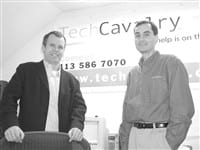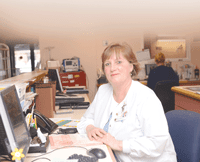TechCavalry To The Rescue As Computer Use Increases In Medicine, So Does The Need For Tech Support
Jef Sharp can track the progress of computers in dental offices. To him, it presents an obvious opportunity.
Sharp, co-founder of TechCavalry, a Northampton-based information technology support company, notes that dentists, over the past decade or so, have increasingly relied on computers for billing, patient records, and inter-office communication. Now, all kinds of medical equipment itself, such as microcameras in scopes to view teeth, are computerized.
“Pretty soon, they’ll be putting microchips in toothbrushes, and your dentist will E-mail you asking why you aren’t brushing,” Sharp joked. But there’s a hint of truth in that exaggeration — people are using computers for seemingly everything, and they can’t be expected to understand every application.
And in health care, where doctors and dentists are preoccupied not only with medical skills, but with finances, changes in the law, and a host of related concerns, technological savvy doesn’t always take priority.
That’s where TechCavalry comes in. The company provides support for anywhere from one to 100 computers, from individual home users who are frustrated and don’t know where to go with computer problems to businesses — including, increasingly, medical and dental offices — that are grappling with network and desktop issues.
“What we’ve really tried to do is take the whole concept of your computer system and boil it down to something that’s more simple for people to understand, as well as maintain and benefit from,” he said. “Computers are a very powerful tool, but people are not using them to their fullest capacity.”
Sharp, who launched TechCavalry about a year ago with partner Jeff Hausthor, hopes to find growing niches for a tech support model that deals with businesses and home users alike and takes their services to the clients, not the other way around.
Shifting Gears
While information technology support services will always be in demand, the dot.com boom came with a rush and ended in a crash, and Sharp and Hausthor were among the casualties.
Before they launched TechCavalry, the pair had opened an E-marketplace called Excess Capacity.
“It was an online trading concept that was completely unique, kind of like an eBay for excess manufacturing capacity,” Sharp said. “A lot of equipment goes unused, and we were trying to create a marketplace for people to list that excess capacity.”
They raised $1 million and were close to closing on a round of venture capital financing when the dot.com meltdown reared its head. Spending froze, and it became clear that large companies weren’t going to invest in Excess Capacity.
“We had to act quickly and decide what we were going to do,” he said. “We needed to start a new company that didn’t require outside investment.”
The pair recognized a demand for services that help people better understand how the computers and networking setups they use every day work.
“As opposed to the individual guy trying to support a lot of small businesses, we thought if we formalized the delivery of these small-business services, it would do much better, and businesses would have a more reliable source of getting computers serviced,” Sharp said.
And it’s not just businesses anymore who need these kinds of services, he added, noting that many homes have multiple computers used for different purposes.
“These people are networking three and four computers together. Their kids have a computer, and both parents have their own computers. They want to network them together, to make them wireless, in many cases to have a direct link to their work computer so they can do some work from home.”
Healthy Networks
Perhaps the company’s most exciting new opportunity is in health care, one of the most important industries in Massachusetts and a field that promises to ride a technological revolution in the new century.
But although more and more of medicine is becoming more computerized, Sharp noted, that doesn’t mean health professionals are any more savvy in using the applications — and the technical support provided by hardware and software manufacturers can often be hopelessly technical in nature, he added.
“We’ve uncovered a number of dental and health care offices, even a veterinarian, that all have a strong demand for not only computer support but for a liaison between their software application provider and themselves,” he said.
The reason is that the manufacturers’ support personnel tend to communicate in “technospeak,” he explained, which can be difficult to decipher for people who aren’t already familiar with the language.
“So, it’s easy for them to take advantage of offices that don’t have a strong understanding of it,” he said, adding that medical offices with fewer than 50 computers generally aren’t able to retain their own technical support staffs.“We know how to talk to people, and we can service them more effectively,” Sharp said. “You have someone who has training as a doctor or, even worse, as an assistant, trying to make heads or tails of a rather complicated system.
We believe in focus,” he continued. “Dentists focus on fixing teeth. Doctors focus on health. We focus on computers and making sure their system is as efficient as possible.”
Helping offices make their billing and record-keeping more efficient is only one piece of the puzzle, he added. Ensuring that the system is secure is more important with the compliance deadline looming for the Health Insurance Portability and Accountability Act (HIPAA), a federal act that mandates a number of patient-privacy efforts.
“We deal with firewalls, internal security, as well as external, which is necessary to keep the system organized, backed up, and archived. They also need to have a plan for disaster recovery — there are just many issues that need to be addressed, and that’s what we do.”
On the Spot
And, importantly, they’re doing it on location, Sharp added.
“The whole concept of us going directly to the client is a nice convenience factor,” he said. “It’s a pain to lug a computer to a place to get looked at. Businesses just don’t have time.”
Convenience isn’t the only benefit, he added. Computers tend to behave in a particular way in the environment in which they’re normally set up. “With anything involving the Internet or networks, it’s best to service them in their own location and find out what quirks they have because all computers have their own personality.”
The company also stresses quality of service, Sharp told The Healthcare News, and offers service contracts that fit the needs of individual clients, including those who need two-hour turnaround times.
“It’s important to have exceptional customer service, especially in something that’s more critical all the time. People are relying on computers more than ever before.”
TechCavalry has 12 employees, and Sharp said both principals and all the technicians have worked in information technology for many years. The realization that the vast majority of computer users don’t share the same expertise — a trend that only promises to increase — is what they’re banking on to make the company a success.
“Whether it’s training that’s needed to use an application, maintenance that’s needed for a network to run more efficiently, or a network that’s not set up properly, if we can improve productivity, we’ll continue to find niches and profits. Businesses and individuals will do better and save time.”
In a health care industry that often struggles with finances in these challenging economic times, TechCavalry is answering a definite need.


